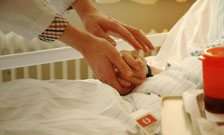A low-cost Breathlessness Support Service (BSS) led to better quality of life and survival rates for patients with lung disease and cancer, according to a study by a team of researchers at King's College London and clinicians from King's College Hospital.
BSS, which integrates palliative care, respiratory medicine, physiotherapy and occupational therapy, improved quality of life and the way patients managed their breathlessness, with BSS patients scoring 16 per cent higher in a measure of breathlessness mastery. This assessed patients' feeling of control over breathlessness and its effects on quality of life and function.
After six months a survival rate of 94 per cent was also reported for BSS patients, compared to 75 per cent for those who did not receive this additional support.
The NIHR-funded study, published today in The Lancet Respiratory Medicine, is the first to test earlier, integrated palliative care in non-cancer as well as cancer patients.
Breathlessness is a common and distressing symptom in many advanced chronic diseases, causing considerable disability, anxiety and social isolation. It affects over 75 million people worldwide each year, including more than 90 per cent of the 65 million people with severe lung disease, over 50 per cent of the 10 million with incurable cancer and 50 per cent of the 23 million with heart failure. In the UK, it affects over two million people each year.
The study focused on patients with refractory breathlessness, where breathlessness persists at rest or on minimal exertion. Those affected have high healthcare needs, poor quality of life, many symptoms beside breathlessness and are frequently admitted to hospital.
In the trial patients were given the unique BSS service, which offered two outpatient appointments and a home visit. This included an information pack and individually tailored treatments to help manage breathlessness.
The group receiving BSS, offered in collaboration with King's College Hospital, had a better quality of life according to a measure that assessed how breathlessness affected their lives. This group also reported better survival rates, with almost all patients alive at six months (94 per cent), whereas almost 1 in 4 in the control group had died (a survival rate of 75 per cent).
Before and after analysis supported this finding, and found that most symptoms andpsychological problems improved in the BSS group, and mostly deteriorated or did not change in the control group.
Professor Irene Higginson, Director of the Cicely Saunders Institute at King's College London, said: 'Breathlessness is a devastating symptom that pervades many illnesses and increases as the disease progresses. It is frightening for patients and their families, often resulting in emergency hospital admissions. It is for this reason that early palliative care has been proposed.
'Breathlessness is as common as pain in many advanced diseases, yet it is overlooked by care and research.
'Crucially, we found that costs of care for the two groups were similar, so this service does not seem to be more expensive than usual care. In addition, as breathlessness support is a short-term service mainly based from outpatients, it would be easy to implement more widely. Future work should now look at testing BSS more extensively, and how its procedures can be introduced morewidely into practice.'
John Moxham, Professor of Respiratory Medicine at King's College London and Director of Clinical Strategy for King's Health Partners, said: 'The results of this study are very exciting. Through close collaborative working, and with the patient centre stage, experts in palliative care, respiratory medicine, physiotherapy and occupational therapy were able to support chronically breathless patients to much better control this frightening sensation.'
Provided by King's College London




















